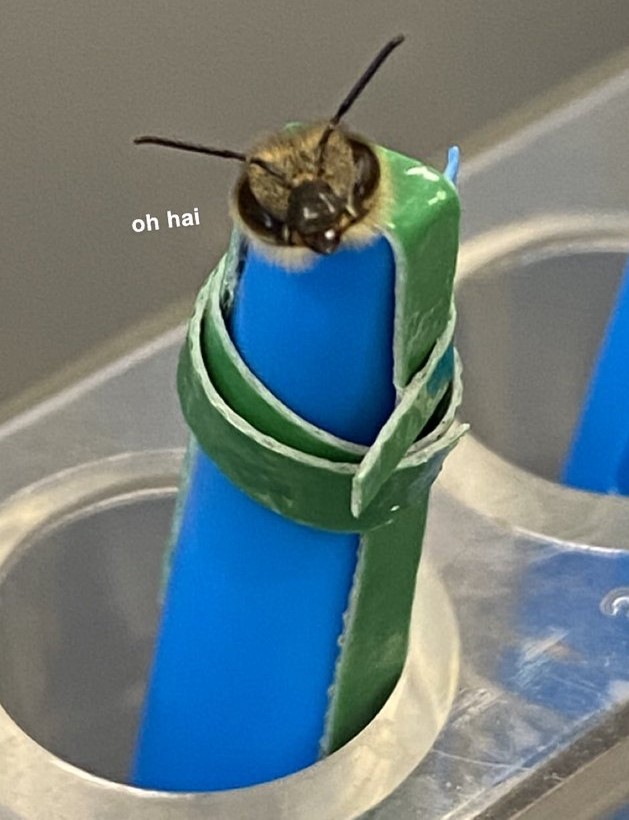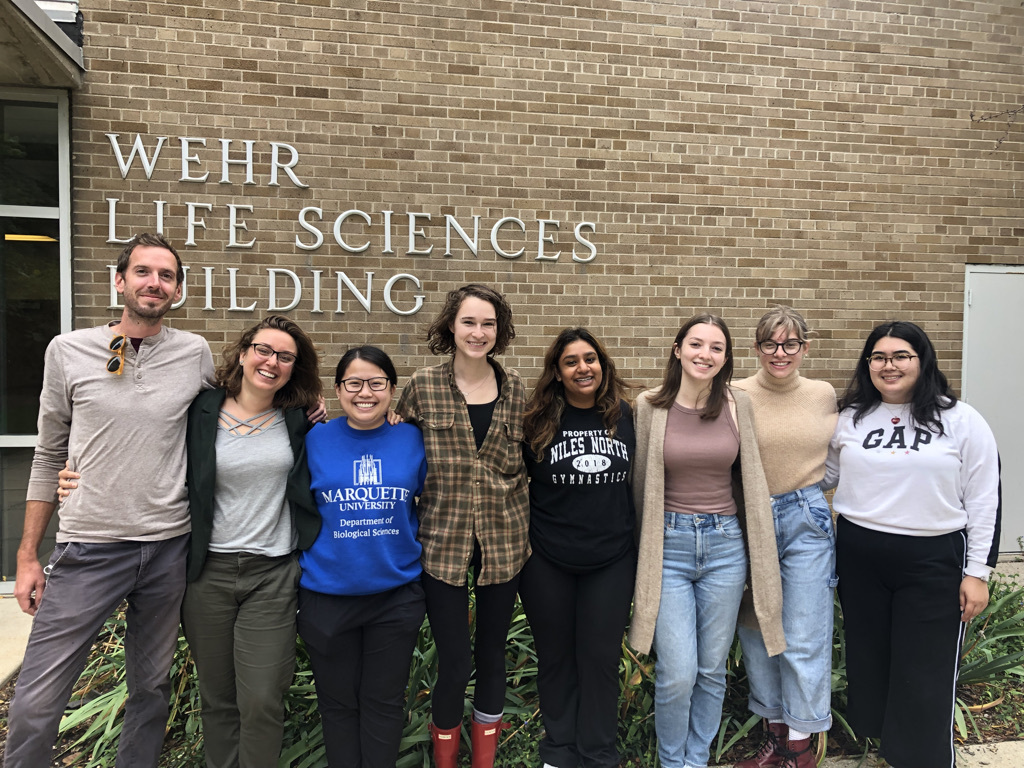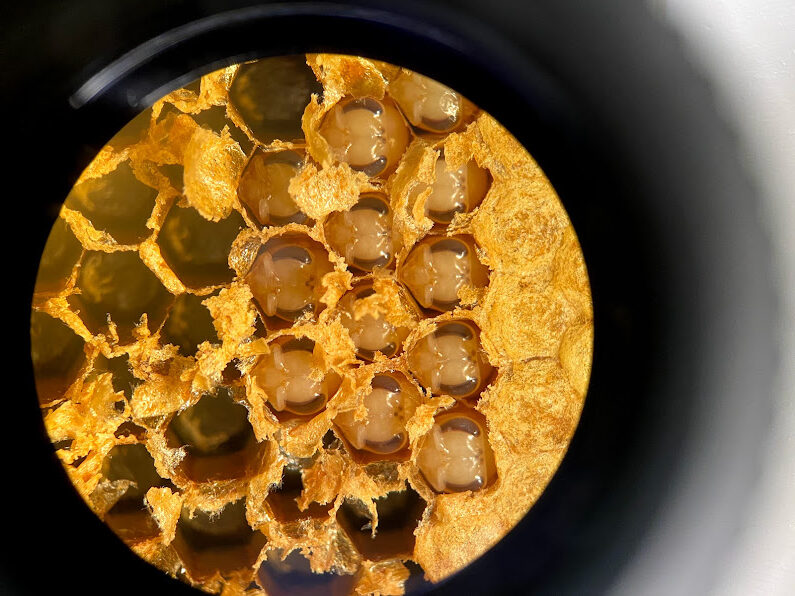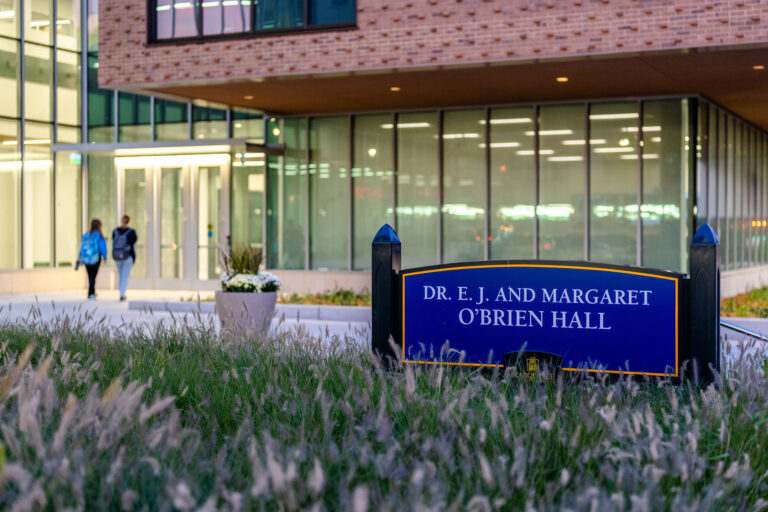By Jill Nuelle, communication intern in the Office of Marketing and Communication
For as long as she can remember, Justine Nguyen has had a fear of bugs and insects — especially bees.
The flying, the buzzing, the stinging. For the graduate student in the Klingler College of Arts Sciences, bees were the last things she wanted to get close to.

But, through many experiments, Nguyen has learned to love them. In fact, her relationship with bees, particularly those in Dr. Chelsea Cook’s research lab, is as sweet as the honey they produce.
Nguyen came to Marquette University with a passion for microbiology — particularly bacteriology.
During her orientation, Nguyen met Cook, an assistant professor of biological sciences, and found herself captivated by Cook’s lab and research. Cook’s work explores physiology, neurobiology and the environment to help understand emergent collective behavior of honeybees.
Nguyen says she had never heard of behavioral ecology but was instantly motivated to figure out how her research interests could be a part of Cook’s studies.
Antibiotics were the answer.

Like agricultural practices common with livestock, commercial beekeepers use antibiotics to prevent disease in hives.
Cook says while some initial research suggests antibiotics perturb honeybee health by disturbing their gut microbiome, not much is known about how this perturbance could influence bee behavior.
Nguyen and Cook set to find out.
Harnessing the power of bees
The professor and graduate student decided to introduce antibiotics to honeybees and observe their behavior and learning capabilities.
Nguyen and Cook hypothesized that since antibiotics have been shown to be detrimental to bee health overall, antibiotics would have the same effect on bee learning and behavior.
In general, Nguyen says, bacteria in the gut produce chemicals that can travel to the brain and contribute to neurophysiological changes. The researchers supposed that once introduced to a bee, the antibiotics would kill the bee’s gut bacteria, essentially cutting off the chemical connection to the brain and stunting learning.
For their research, Nguyen, Cook and their research team conducted experiments on a sample of more than 300 bees whose colonies are located on the roof of Wehr Life Sciences.
The bees were fed a sucrose solution spiked with a concentration of Terramycin — an antibiotic commonly used in beekeeping — 24 hours before the bees were administered a learning test.
During the tests, researchers exposed the bees to a puff of a scent they had never smelled. Immediately after, a researcher would touch the bee’s antenna and feed them sucrose.
To perform the tests, the bees had to be secured in tiny harnesses.

“To get the bees in the harnesses, they were placed on an ice cube,” Nguyen says. “Bees cannot regulate their body temperature, so the cold temporarily puts them to sleep.”
The team wanted to see if the bees would make a cognitive connection between the odor and the sucrose solution by sticking their tongues out when exposed to the smell.
‘We have a lot to learn from bees’
The research team found that bees that were fed antibiotics had stronger learning capabilities than those not exposed to antibiotics.
“The results were the exact opposite of what we had predicted,” Nguyen says. “And the support of this alternative hypothesis demonstrates one of the great things about science: once you answer one question, 10 new ones pop up.”
Looking back, Nguyen says she never thought she would be this inquisitive about bees; nevertheless, she has learned that bees are often misunderstood.
“I would have never imagined that I would end up in a bee lab. After working with them for about a year now, I’ve come to understand that these are super charismatic insects,” Nguyen says. “There’s a lot of things going on in that little, tiny brain of theirs, and we underestimate the behaviors and the kind of cognitive thinking that they are able to do.”
Nguyen, Cook and the rest of the research team plan to conduct further tests this summer to learn exactly how acute exposure to antibiotics increases cognition in bees and how the gut microbiome affects the social dynamics and collective behavior of a hive.

But the research goes beyond bees.
Nguyen says bees have a simple and easily manipulated gut microbiome, which allows the research team to extrapolate the research results to humans.
“Humans share a lot of the same bacteria found in honeybees,” Nguyen says. “By studying these effects on the bacteria of honeybees, not only do we gain insight on how their societal organization works, but the potential to gain knowledge about our wider human society. Bees really are fascinating. We have a lot to learn from bees.”



